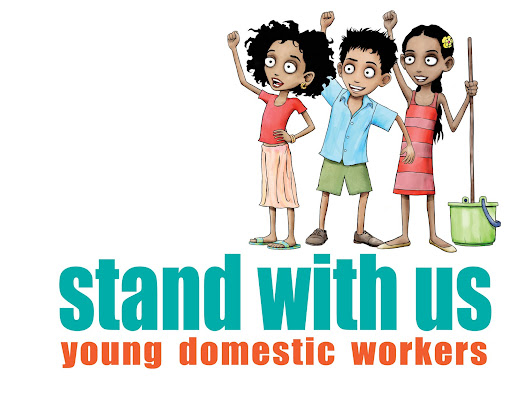This is her speech:
I am Lilibeth Masamloc from the Philippines. I am a former Child Domestic Worker, I started working at the age of 13. I am one of the hundreds of child domestic workers that Anti-Slavery International has been working with over the past 20 years.
In many countries domestic work is the only way children can earn enough to feed themselves or support their family. Domestic work is not always detrimental to children. However, it needs to be strictly regulated to stop the abuse that so many of my fellow child domestic workers suffer from.
We need to put an end to this exploitation and abuse.
You are being given an opportunity this week to take action that will change the lives of millions of children across the world.
Over the past two years 500 child domestic workers, including myself, have been consulted on how this convention can improve our lives. We support Article 4 and Paragraph 4 of the current draft of the convention and recommendation and we believe they offer us the protection that other international standards have failed to provide - until now. We are children but we are also workers and we think we have a right to be protected like any other worker. We need special protection from the hazards of domestic work that are particular to us being children.
On behalf of my fellow child domestic workers I am asking the committee to take into consideration our views on how these provisions should be understood.
In every continent, child domestic workers have expressed their hope for the change that the convention will bring. They welcome the reaffirmation that domestic work is not a suitable occupation for children under the age of 14. Young domestic workers are often deprived of an education; this limits their chances for a better life. We therefore think it is very important that our right to education is promoted in Article 4 of the convention. However, full implementation of our right to education will require states to address the obstacles that stop us from attending school. The fees and other costs of schooling and the lack of support from our employers mean that many of us cannot attend or drop-out of school.
But it is in the area of hazardous work (Paragraph 4 of the recommendation) where our position as children - as opposed to adults – needs particular attention. Child domestic workers cannot be expected to perform the same tasks as adults. For example: my fellow child domestic workers are commonly asked to care for babies on their own, have to work throughout the night, and carry loads that are almost as heavy as themselves. We want to be involved in negotiating the contracts that will help us identify, from the beginning of our employment, which tasks we will be expected to do and which we are not able to take on.
Much of our vulnerability to exploitation and abuse comes from our invisibility and isolation in our workplace. We often live far away from our parents, our siblings and our friends. We are totally dependent on our employers to treat us well, so we need our working and living conditions to be closely monitored. This can be done by regular visits from state officials (accompanied by a social welfare officer) who speak privately to us about all aspects of our working and living conditions.
We call on the constituents of this committee to fully support Paragraph 4 of the recommendation. We believe it will help to protect us from hazardous domestic work.
This committee is very crucial to us. We are calling for the adoption of the convention and immediate ratification. We have been ignored and lived in the margins of society for so long, now is the time to protect us.




